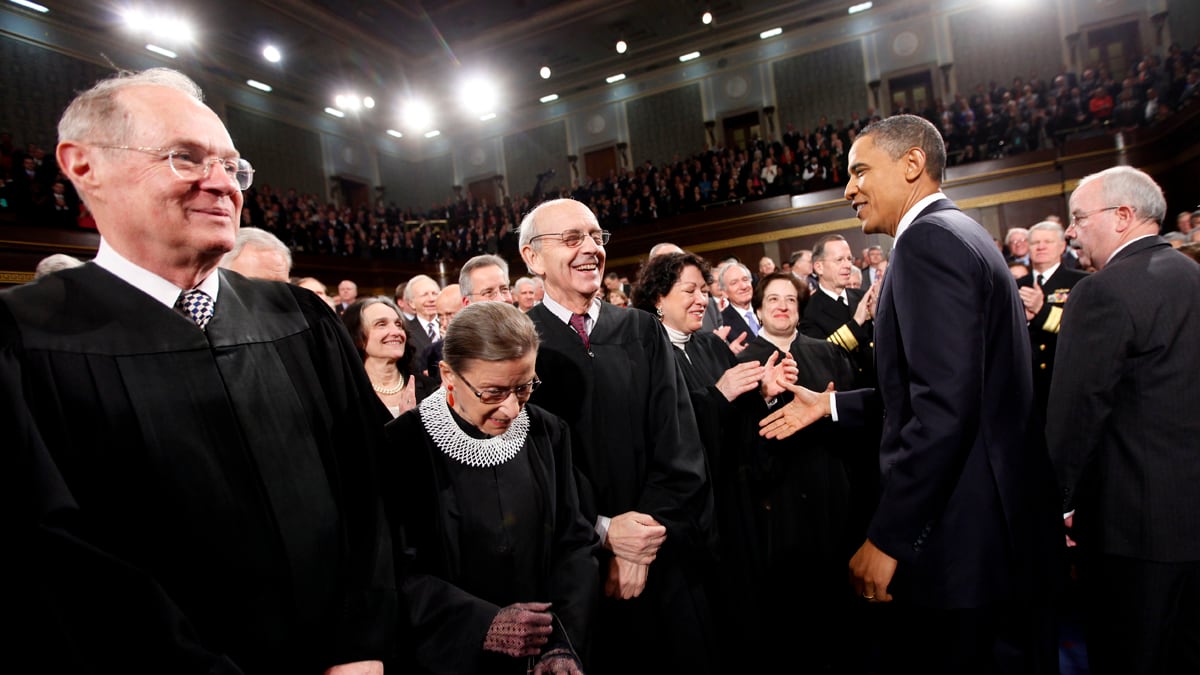Barack Obama isn’t very good at playing legal politics. The New York Times reports that a startling number of Obama’s prospective nominees to the federal bench—14 in all—have gotten a rating of “not qualified” from the American Bar Association, to which Obama sent those nominations before formally submitting them to the Senate.
That represents approximately one out of every 13 prospective nominations. By way of comparison, both Presidents Clinton and George W. Bush were four times less likely to see a nominee deemed “not qualified” by the ABA.
The demographics of Obama’s dinged nominations—all of which were withdrawn rather than being made public by submission to the Senate—are even more startling: eight of the 14 are minorities, and only one is a white male. To put it another way, while only 4 percent of Obama’s white nominees have been deemed “not qualified” by the ABA, nearly 15 percent of his ethnic-minority picks received that rating, which in effect kept their nominations from ever being considered by the Senate.
ADVERTISEMENT
Naturally, right-wing critics, who for years have decried the ABA’s supposedly liberal bias in vetting judicial nominations, are interpreting the otherwise inconvenient fact that the ABA has been much harder on Obama’s choices than Bush’s as “proof” the Obama administration is letting affirmative-action considerations get in the way of merit when it selects potential judges.
Liberals, by contrast, will wonder if the ABA committee, which makes these decisions on the basis of such vague criteria as whether candidates have a suitably judicial “temperament,” is prone to the same sorts of (probably unconscious) biases that may have had something to do with the rash of gossipy, anonymously sourced stories about Sonia Sotomayor’s supposed weaknesses that surfaced when Obama nominated her to the Supreme Court.

Since the ABA’s conclusions are secret, there’s no way to evaluate which assumption is a more accurate reflection of the facts. Nevertheless, it seems highly improbable that the difference between the rejection rate for Obama's candidates and those put forth by the Bush administration can be explained by the former’s greater commitment to affirmative action.
It’s true that 31 percent of Obama’s potential judicial nominees have been minorities, while “only” 18 percent of Bush’s were. But consider how much deeper the pool of liberal ethnic-minority candidates is than that made up of conservative minorities. In 2008 Obama received 95 percent of the African-American vote, and 67 percent of the votes cast by Hispanics. Those figures suggest that, relative to the available candidates, the Bush administration engaged in more aggressive affirmative action when it came to nominating federal judges than the Obama administration has.
The explanation for why Bush’s judicial candidates did so much better before the ABA than Obama’s have is probably quite simple: just two months into his first term, Bush informed the ABA that he would not submit proposed nominations to the group prior to formally nominating his picks. This political power play turned out, in retrospect, to be extremely effective. It’s much harder for the ABA to give a thumbs-down to a public nomination that it is for it to secretly quash a potential nominee.
In the former case, a Republican president can always claim that opposition is a product of supposed “liberal bias” (That a bunch of rich, socially well-connected corporate lawyers actually represent a hotbed of left-wing politics is a theory that makes no sense on its face, but of course a theory doesn’t have to make any sense to still function as an effective political talking point.)
Because of the rather bizarre rules of contemporary American politics, which make it impossible to argue that large, powerful organizations might be prone to “conservative bias,” Obama can’t simply reverse Bush’s claim—but he could argue that the fact the organization is shooting down his nominations of minority candidates at three times the rate it’s disapproving of his white choices is a symptom of another kind of bias.
But Obama, unlike Bush, can’t engage in any public criticism of the ABA’s vetting process, because he handed back to the organization the power that Bush took away from it, when Bush refused to give it a secret veto over his potential judicial nominees.
Perhaps it’s not surprising that a former editor of the Harvard Law Review and former University of Chicago Law School professor is too deferential to the legal establishment. Still, there’s a lesson in all this for future presidents: don’t give a private, unelected organization the power to reject the decisions of our elected officials without at least forcing it to explain itself in the court of public opinion.






